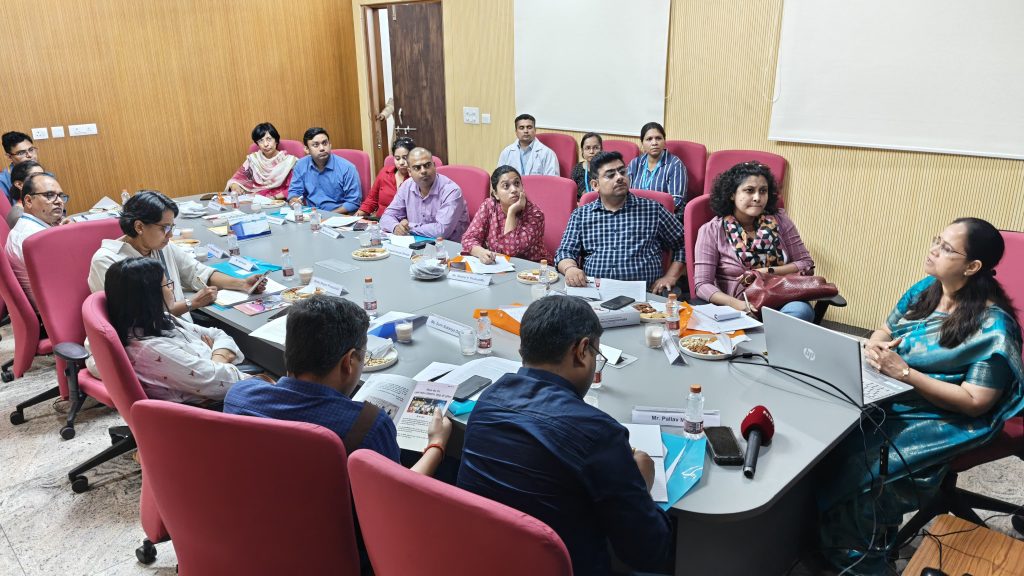ICMR-CRMCH inaugurated in December 2022 by Prime Minister Narendra Modi as a flagship initiative under the National Sickle Cell Elimination Mission, with the goal of eliminating the disease by 2047
Health Technology Assessments led by Department of Health Research (DHR) helped cut the cost of sickle cell diagnostic kits from ₹350 to under ₹50 per test, saving the government nearly ₹1,857 crore.
A 10-member National Media delegation, led by Dr. Manisha Verma, Additional Director General (Media), Union Ministry of Health and Family Welfare, visited the Indian Council of Medical Research’s (ICMR)- Centre for Research, Management and Control of Heamoglobinopathies (CRMCH) in Chandrapur district of Maharashtra today. The delegation also visited ICMR-National Institute of Virology in Pune earlier this week.

At the ICMR-CRMCH, the delegation was received by Dr. Manisha Madkaikar, Director, who provided an in-depth overview of the Centre’s pathbreaking work in tackling haemoglobinopathies — especially Sickle Cell Disease (SCD) and Thalassemia — conditions highly prevalent in the Vidarbha region.
Dr. Madkaikar highlighted the Centre’s holistic approach, which includes genetic research, patient counselling, diagnostics, and free clinical care. “Our efforts are aimed not just at treatment but also early detection and prevention, especially among tribal populations,” she said. The Centre also collaborates with local government medical colleges and NGOs to run monthly clinics and outreach camps.
The delegation visited CRMCH’s state-of-the-art laboratories for blood testing, molecular diagnostics, and genome sequencing. They also interacted with patients and families availing services at the centre, witnessing firsthand the impact of cutting-edge medical science reaching grassroots levels.
A National Mission in Action
ICMR-CRMCH was inaugurated in December 2022 by Prime Minister Narendra Modi as a flagship initiative under the National Sickle Cell Elimination Mission, with the goal of eliminating the disease by 2047. The centre is currently engaged in several vital research projects, including the validation of cost-effective indigenous diagnostic kits for early SCD detection.
Pioneering Solutions at ICMR-NIIH
The visit also highlighted the significant achievements of the ICMR-National Institute of Immunohaematology (NIIH) in Mumbai, which oversees CRMCH. Known for the discovery of the Bombay Blood Group and the establishment of India’s first Molecular Immunohaematology Lab, ICMR-NIIH continues to lead innovation in blood and immune disorders.
Some of its key initiatives include:
Point-of-Care (POC) Diagnostic Kits for Haemophilia A and von Willebrand Disease, reducing testing costs from ₹2,086 to ₹582 per patient, with potential to detect over 83,000 undiagnosed cases and save ₹42 crore in public healthcare expenditure.
HTA-Backed Cost Reductions: Health Technology Assessments led by Department of Health Research (DHR) helped cut the cost of sickle cell diagnostic kits from ₹350 to under ₹50 per test, saving the government nearly ₹1,857 crore.
Rare Donor Registry of India (RDRI): A national database for ultra-rare blood types, now supporting emergency transfusions across the country and saving countless lives.
Centre of Excellence for Inherited Immune Disorders: Providing advanced testing, genetic counselling, prenatal screening, and training, benefiting hospitals across India and South Asia.
Through innovation, collaboration, and targeted outreach, ICMR-NIIH and CRMCH are scripting a new chapter in India’s battle against hereditary blood and immune disorders — ensuring that science serves the most vulnerable and no patien is left behind.
👉 Click here to read the latest Gujarat news on TheLiveAhmedabad.com



